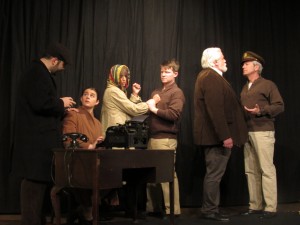
The real Wilhelm Furtwängler was a polarizing and divisive figure in 20th Century music. Universally acclaimed as one of the greatest orchestra conductors of all time, he chose to remain in Germany during its Nazi years between Adolf Hitler coming to power in 1933 and the end of World War II in 1945.
Furtwängler made abundantly clear that he saw the Nazis as the cultural philistines and boors that they were, and because he viewed himself as an apolitical artist regarded their crimes against art as worse than their crimes against people. He defended many Jewish and other persecuted musicians not because of a conventional humanitarian impulse, but because he saw them as good musicians whose absence would diminish German music. At the same time, the Nazis saw him as absurdly naive and therefore easily manipulated to lend legitimacy to their own grandiose cultural claims.
The Renaissance City Theatre, under Artistic Director David Jepson, has taken on a challenging and intense inquiry into the mind of a man put in an impossible position, struggling with a love of his country and culture that gave birth to Beethoven and Brahms as well as to Hitler and Goebbels — a contradiction that stands at the root of the enduring mystery of how tens of millions of supposedly civilized ordinary people could embrace murderously dictatorial fascism. Although entirely fictional in characters (other than Furtwängler) and its setting (a de-Nazification investigation conducted after the war), the play is otherwise remarkably faithful to historical fact.
All three acts are set in the postwar Berlin office of American Major Steve Arnold (Marcus Fisk), who in civilian life investigated cases of insurance fraud and is therefore convinced that the esteemed conductor Wilhelm Furtwängler (Greg Bliven) must be hiding something behind the numerous testimonials by people he saved. Assisting the major are Lieutenant David Wills (Jim Auger), a German-speaking, Jewish American officer born in Hamburg, and a German secretary, Emmi Straube (Courtney Littlefield), whose father was a general implicated in the plot to assassinate Hitler.
Among the other interviewees confronted by the major is Helmuth Rode (Ryan Sekac), a second violinist under Furtwängler, whose limited skills would not have justified even the position of second violinist except for the many vacancies resulting from the purge of Jews. Finally, there is also Tamara Sachs (Genevra Stewart), the widow of a Jewish musician whom Furtwängler helped escape to Paris, although he was then captured and killed in the Fall of France. Out of a sense of gratitude, Mrs. Sachs has collected letters from many people around the world testifying to how Furtwängler saved their lives.
Ultimately, Major Arnold asks what he explicitly says is the one question Furtwängler cannot answer: Why, when you were free to leave and could have done so, did you choose to stay in Nazi Germany? By staying, the major asserts, Furtwängler by his mere presence became a collaborator with the Nazis, lending them legitimacy and helping their propaganda. The answer to that question, and the sufficiency of that answer, form the core tension of the play.
Working from a tight script, the whole cast skillfully evokes the dark postwar era when cream and sugar with coffee were luxuries beyond the reach of ordinary civilians and found only in the American sector. Fisk, who in real life is a retired Navy captain and Annapolis graduate, masterfully nails the hard-nosed American major who keeps calling Furtwängler a “bandleader” and regards his secretary’s attempts to play Beethoven records in the office as annoying. (Fisk said that he modeled his portrayal on an officer he knew who was “a real asshole.”) After the play, Fisk told me that he grew up as an Army brat, the son of a tank commander stationed in Germany from 1962 to 1966, and that the family traveled to Berlin in 1964, crossing through the recently constructed Berlin Wall at Checkpoint Charlie. On the eastern side, he said, there was still bombed-out rubble, unrepaired two decades after the end of the war.
Bliven, despite looking nothing like the tall and thin real-life Furtwängler, plays the role with a superb command of a man broken by his brush with evil. Bliven told me that he sees his Furtwängler character as totally convinced of his own innocence, but I doubt that interpretation: as the play progresses, it seems to me that Furtwängler necessarily questions his own guilt and responsibility, and this motivates his increasingly strident justifications. It may not be apparent to the audience, but much of what Furtwängler in the play says in his own defense is taken verbatim from the historical Furtwängler, as reported by his biographer, Curt Riess.
Sekac as Rode has a meatier role than is apparent at first, and he rises to the occasion. Stewart as Sachs is very sympathetic as she fights to retain what is left of her mind, shattered by horrifying experience. Littlefield as Straube, with her Beethoven records, is very effective as the embodiment of what common decency can be salvaged from the carnage of war. Auger as Wills is not given much to do by the script, but he has one brilliant scene where he recounts his experience as a young boy hearing Furtwängler conduct.
Renaissance City Theatre at the Granite Theatre mounts an ambitious and brilliant performance of an intellectually engaging yet entertaining play that, while difficult to classify, approximates courtroom drama. It’s worth the drive to Westerly.
If anything, the play is simply too short to include everything that an audience might want. Furtwängler’s backing of composer Paul Hindemith is mentioned only in passing, but Hindemith more than anyone else was a true subversive, demonstrating the inextricable link between music and politics that Furtwängler refused to accept. In 1916, Hindemith proposed an “anti-music” composition that would consist of nothing but several minutes of silence – decades before an American came up with the same idea in 1952. In 1925, when Hitler was still just a lunatic shouting on a soapbox, Hindemith satirically skewered the pomposity of Wagnerian opera that would become the signature artistic ideal of the Nazis, composing “Overture to the ‘Flying Dutchman’ as Played on Sight by a Bad Spa Orchestra by the Village Well at 7 in the Morning,” to be played deliberately off-key by musicians seemingly suffering from severe hangovers. But Furtwängler’s public defense in 1934 was precisely because Hindemith, for his own reasons, had by then adopted a more conventional style, incorporating folk themes that the Nazis favored. Unlike Furtwängler, Hindemith immigrated — to Switzerland in 1938 and to the United States in 1940.
Likewise, the play is too soft on Herbert von Karajan, who despite joining the Nazi Party in Austria in 1933 was rehabilitated to respectability and was internationally acclaimed at the time of his death in 1989. A careerist and an opportunist rather than an ideologically committed Nazi, von Karajan was advanced and promoted in his career by the Nazis in exactly the way Furtwängler was not.
There was a famous confrontation in 1937 between Furtwängler and Arturo Toscanini – who was in the process of escaping fascist Italy for the United States after being beaten by Mussolini’s Blackshirts – and, as John Ardoin in The Furtwängler Record points out, two contradictory accounts of the encounter exist. Howard Taubman, Toscanini’s biographer, describes it as fairly short:
“‘I don’t want to see you,’ Toscanini said. ‘Why?’ ‘Because you’re a Nazi.’ ‘It’s not true,’ Furtwängler protested. ‘Yes you are,’ Toscanini insisted. ‘Whether you have a party card or not. In London you lunch with Jews to make a good case for yourself so that you won’t lose your position in the West. In Germany you work for Hitler.’ Toscanini then turned his back on the tall man, who slowly walked away.”
Furtwängler’s biographer Curt Riess gives an alternative, lengthier version that provides the basis for some of the words in the play:
“[Furtwängler said,] ‘Personally I believe there are no enslaved and free countries. Human beings are free wherever Wagner and Beethoven are played, and if they are not free at first, they are freed while listening to these works. Music transports them to regions where the Gestapo can do them no harm.’ Toscanini was silent and Furtwängler continued: ‘If I conduct great music in a country that is by chance ruled by Hitler, must I therefore represent him? Does not great music, on the contrary, make me one of his antagonists? For is not great music utterly opposed to the soullessness of Nazism?’ Toscanini shook his head, he could not agree. ‘Everyone,’ he said, ‘who conducts in the Third Reich is a Nazi!’ Furtwängler emphatically denied this. ‘By that,’ he said, ‘you imply that art and music are merely propaganda, a false front, as it were, for any Government that happens to be in power. If a Nazi Government is in power, then, as a conductor I am a Nazi; under the communists, I would be a communist; under the democrats, a democrat… No, a thousand times, no! Music belongs to a different world, above chance political events!’ Toscanini shook his head. ‘I disagree!’ he said, and that ended the discussion which had lasted only a few minutes.”
Taking Sides wisely leaves the audience to ponder who was right.
Taking Sides, by Sir Ronald Harwood, directed by Jude Pescatello, performed by Renaissance City Theatre at the Granite Theatre, 1 Granite St, Westerly. About 2h10m including 10m intermission. Through May 13. Tel: (401)596-2341 Web: granitetheatre.com/productions-new/147-taking-sides Facebook: www.facebook.com/events/249861338822116/




